Introduction
Navigating the complexities of raising a child with autism spectrum disorder (ASD) can be a daunting journey for many parents. Relationship Development Intervention (RDI) offers a dynamic and parent-mediated approach designed to enhance social and emotional development in children with ASD. Developed by Dr. Steven Gutstein, RDI emphasizes the importance of fostering genuine relationships and improving the ability to engage in reciprocal interactions.
This innovative methodology guides children through developmental milestones, facilitating connections with others in a structured and supportive environment.
Research underscores the significance of early intervention mediated through parents, highlighting that early signs of autism can be effectively addressed through parental guidance. Studies reveal that responsive parent-child interactions are associated with positive outcomes, reinforcing the pivotal role parents play in their child's developmental journey. By leveraging the unique and privileged relationship between parent and child, RDI empowers families to create an environment of emotional predictability and accessibility.
This approach not only enhances the social and emotional capabilities of children with autism but also empowers parents to become active participants in their child's growth, ensuring consistent progress and fostering a sense of belonging and confidence in their children.
What is Relationship Development Intervention?
Relationship Development Intervention (RDI) is a dynamic, parent-mediated approach designed to enhance social and emotional growth in individuals with autism spectrum disorder (ASD). Developed by Dr. Steven Gutstein, RDI focuses on fostering genuine relationships and improving the ability to engage in reciprocal interactions. The methodology emphasizes the importance of guiding children through developmental milestones, helping them build connections with others in a supportive and structured environment.
Research underscores the value of early intervention mediated through parents, as highlighted by Dr. Hannah Schertz's work at Indiana University Bloomington. "Dr. Schertz's research, supported by the Institute of Education Sciences (IES), highlights that early indicators of autism can be managed effectively through parental guidance, which focuses on communication - the central challenge of autism.". Her findings show that preverbal social communication is correlated with later language competency, making early parental involvement crucial.
Furthermore, responsive and engaging parent-offspring interactions have been associated with positive outcomes for autistic individuals. Research carried out in New Zealand showed that low-intensity, parent-driven support significantly enhanced youth engagement during interactions. This evidence supports the notion that parents play a pivotal role in reinforcing and extending the lessons from therapy sessions into everyday life, ensuring consistent progress in social, communication, and adaptive skills.
The success of RDI lies in its ability to leverage the unique, privileged relationship between parents and their offspring. By interpreting non-verbal signals and reacting sensitively to their offspring's needs, parents can create an atmosphere of emotional predictability and accessibility. This relational competence allows young individuals to cultivate important interpersonal abilities within an environment they trust and comprehend.
In essence, RDI not only aims to enhance the emotional capabilities of children with autism but also empowers parents to become active participants in their offspring's developmental journey. This approach aligns with a strengths-based perspective, recognizing and building upon the inherent abilities of individuals with autism to help them reach their full potential.
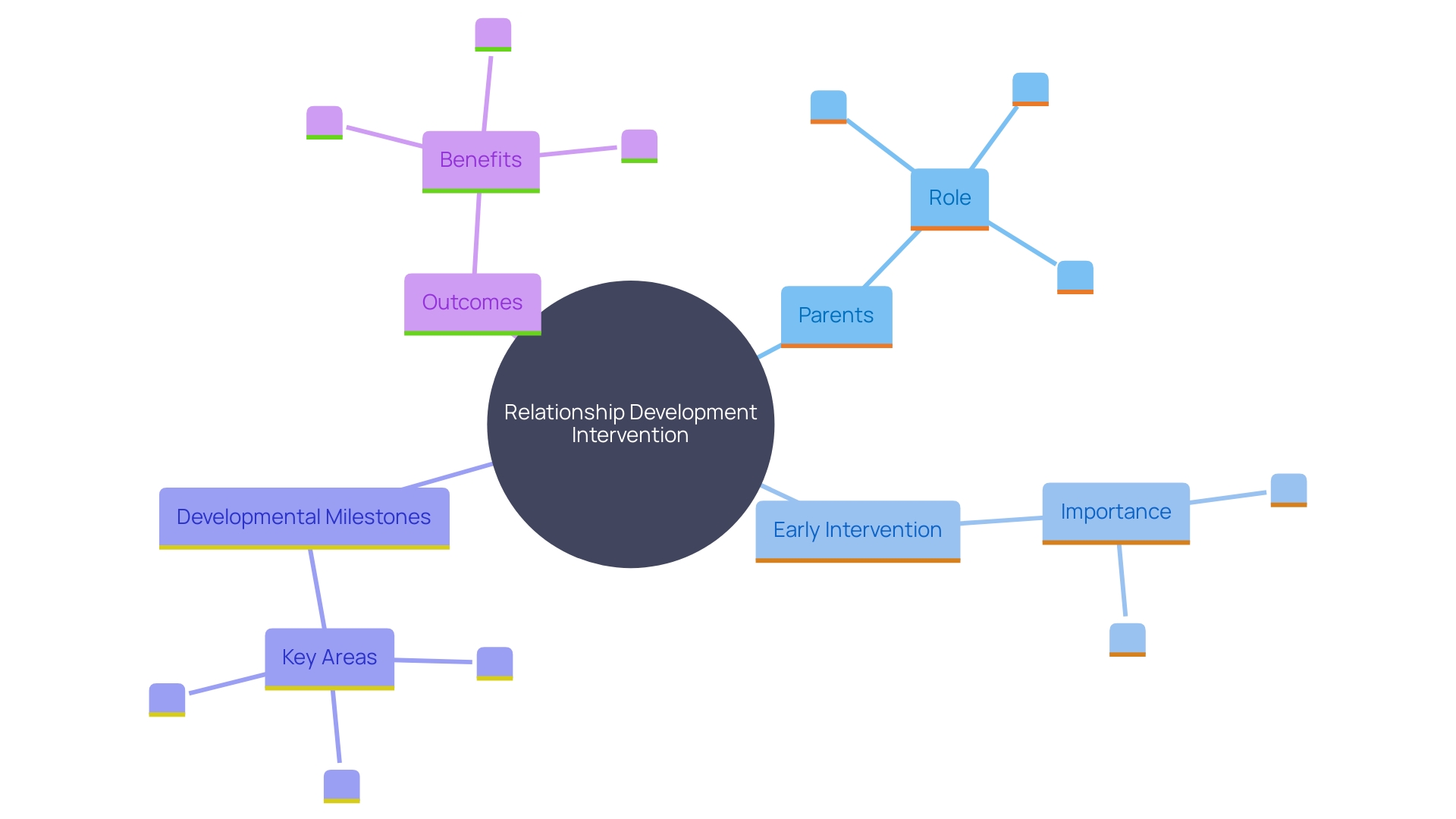
Key Principles of RDI
Relationship Development Intervention (RDI) is grounded in key principles that differentiate it from conventional behavioral approaches. At the core of RDI is the notion of 'dynamic intelligence,' which is the ability to think flexibly and adapt to changing interpersonal situations. This approach motivates young individuals to cultivate problem-solving abilities and understand their interpersonal experiences, which is essential for their development.
RDI places a strong emphasis on the role of parents as active facilitators of their offspring's development. Research highlights the significance of parental guidance in early support, especially for enhancing communication abilities in young children with autism. Dr. Hannah Schertz, a professor at Indiana University Bloomington, emphasizes that guiding parents to use mediated learning practices can significantly improve communication skills in toddlers. Research has demonstrated that early developmental support can enhance fundamental difficulties related to autism, particularly in communication with others.
Moreover, early and family-empowering actions are vital. Recent longitudinal studies, like the Canadian Pathways in ASD Study, provide compelling evidence supporting the integration of ecological approaches into autism services. These measures are created to be suitable for developmental stages and customized to the distinct requirements of young individuals facing communication difficulties.
The efficacy of RDI is supported by a growing body of evidence. For example, naturalistic developmental behavioral interventions have demonstrated significant positive effects on adaptive behavior, language, play, and interpersonal communication. These findings emphasize the potential of RDI to encourage meaningful interactions and support independence in children with autism, all while empowering parents to be central figures in their offspring's developmental journey.
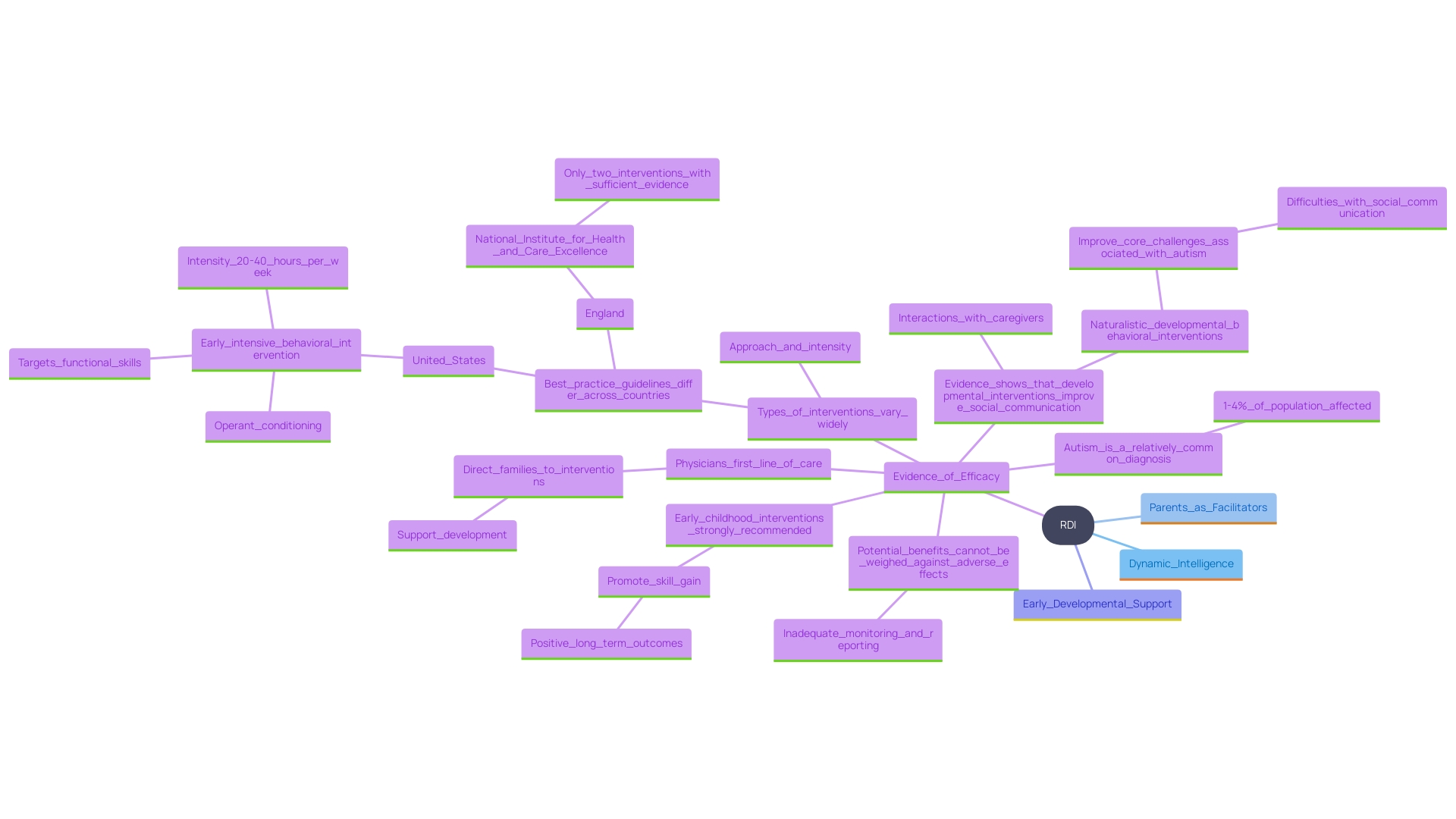
Benefits of RDI for Individuals with ASD
RDI provides significant advantages for individuals with ASD, especially in improving their interpersonal skills and emotional understanding. This approach emphasizes relationship-building and assists young individuals in developing greater empathy and enhancing communication skills, fostering independence. Parents frequently mention considerable enhancements in their child's capacity to participate in conversations, form friendships, and maneuver through interpersonal settings. Research supports the necessity of integrating ecological approaches into autism services, highlighting the importance of early, family-empowering measures. For example, the Canadian Pathways in ASD Study underscores the efficacy of such methods in promoting social communication.
Moreover, computer-assisted methods have shown promise in supporting the treatment of ASD. These tools, such as virtual human simulations, help individuals recognize and respond to emotions, promoting a deeper understanding of empathy. By incorporating inputs from parents and therapists, these approaches can be tailored to the specific needs of children with ASD, enhancing the learning process.
Data from different research indicate that early intervention, especially those facilitated by parents, greatly enhances communication skills among toddlers with autism. Observational and survey measures consistently show positive outcomes in community validity, feasibility, and fidelity. As young individuals advance through the RDI program, they acquire confidence and a sense of belonging, which are essential elements of emotional well-being. Tackling the fundamental challenges associated with autism at an early stage gives these individuals a strong basis for verbal interaction and active participation in communal learning.
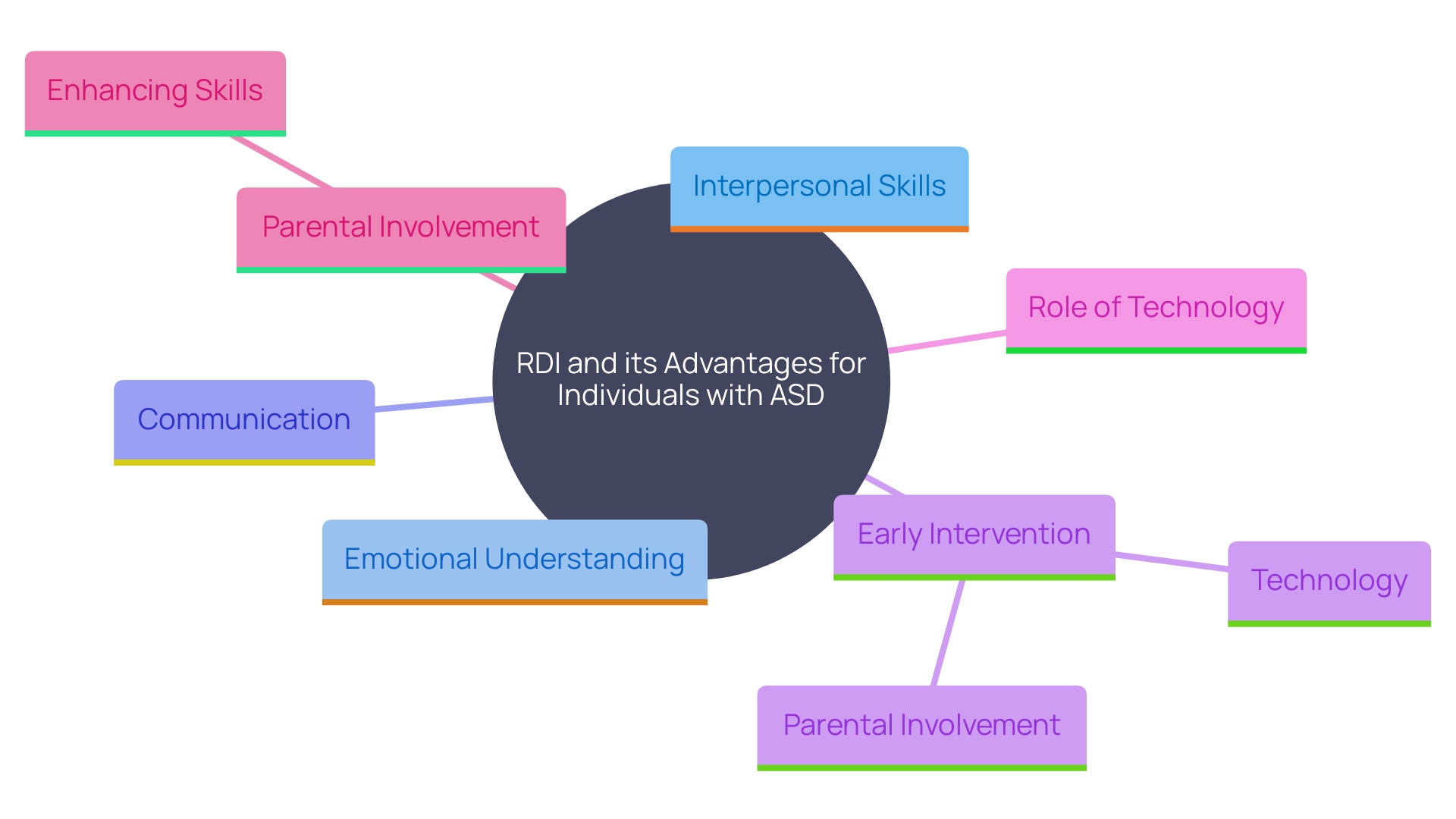
How RDI Differs from Other Interventions
Unlike many traditional therapies that prioritize the reduction of specific behaviors, Relationship Development Intervention (RDI) takes a holistic approach that emphasizes developmental growth. While other interventions may focus on compliance and direct skill acquisition, RDI nurtures the underlying processes that enable meaningful interactions. 'This emphasis on connections rather than simple behavior modification distinguishes RDI, rendering it a distinctive and successful choice for families aiming to enhance their offspring's interpersonal and emotional skills.'. Dr. Hannah Schertz, a professor at Indiana University Bloomington, emphasizes the significance of assisting parents in utilizing mediated learning techniques to enhance interaction in young children with autism. Her research highlights that early action aimed at communication can result in substantial enhancements in language proficiency later on.
In contrast to the highly structured and intensive methods of early intensive behavioral programs, which dominate the landscape despite varying degrees of evidence supporting their efficacy, RDI offers a more naturalistic and developmentally-informed approach. This method aligns with findings from naturalistic developmental behavioral approaches, which have been shown to improve core challenges associated with autism, particularly difficulties with social communication. 'Notably, a comprehensive meta-analysis led by Michael Sandbank from UNC School of Medicine reveals that many low-quality studies dominate the field, often dictating recommendations and patient outcomes without adequate monitoring of potential adverse effects.'.
The proliferation of for-profit autism community-based agencies (CBAs) in the US, driven by increased demand and improved insurance coverage, further complicates the landscape. These agencies often depend on organized approaches based on Applied Behavior Analysis (ABA), which, despite serving many autistic individuals and generating significant revenues, lack sufficient effectiveness research. This fragmented landscape of autism interventions highlights the necessity for a more personalized and relationship-oriented approach like RDI, which emphasizes the developmental needs and communication growth of individuals with autism.
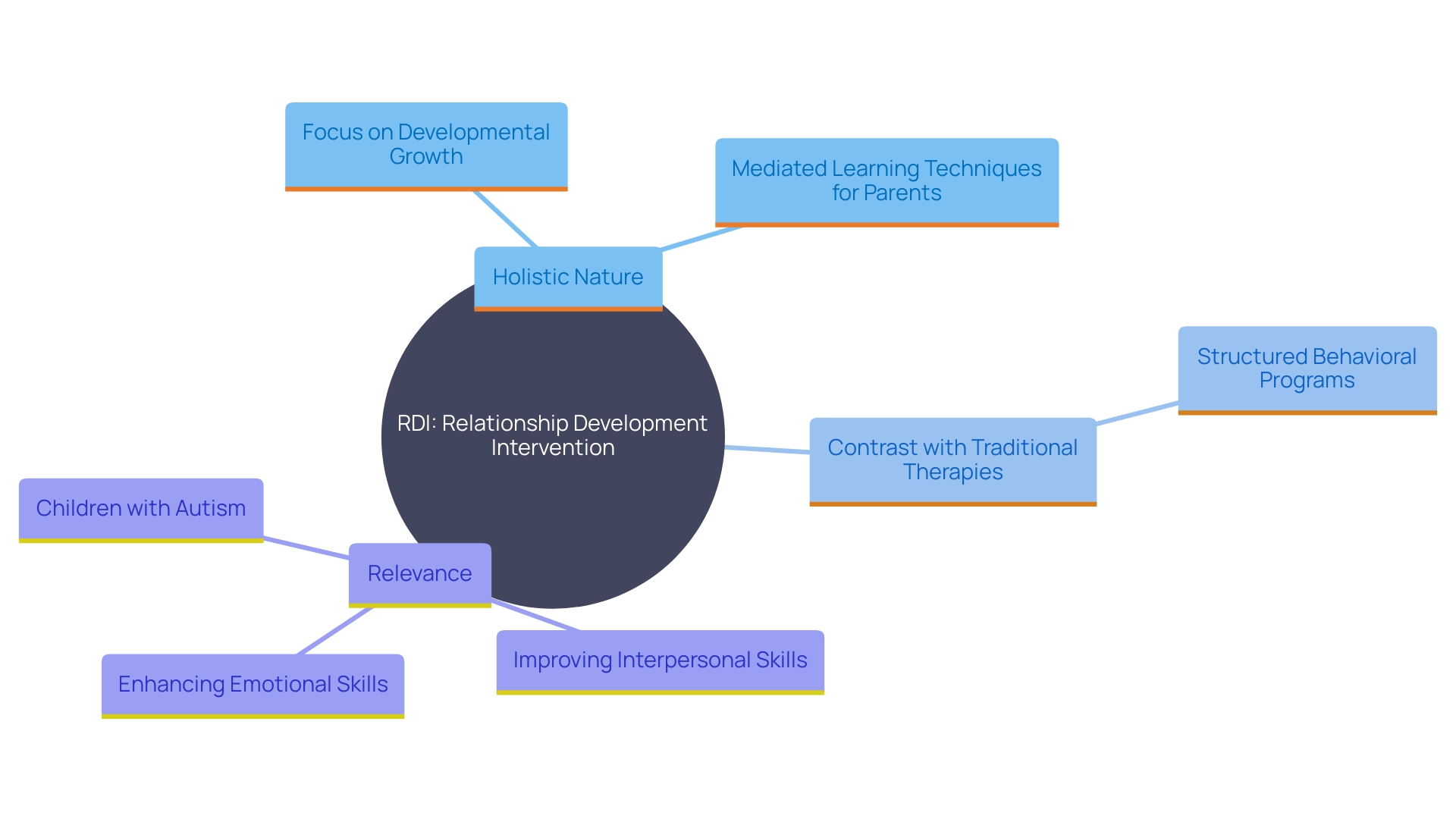
Implementing RDI in Daily Life
Incorporating RDI principles into everyday practices can be life-changing for families, especially those with young individuals showing early signs of autism. Parents are encouraged to create opportunities for shared experiences, fostering a collaborative environment where children can practice interpersonal skills. This may involve participating in joint activities, discussing emotions, and demonstrating suitable interpersonal behaviors. Studies indicate that parent-led strategies are not only practical but also successful in tackling fundamental relational challenges, highlighting the significance of parental engagement. By incorporating RDI into daily routines, parents can strengthen the abilities their offspring are acquiring and assist them in applying these skills to different environments. As highlighted in a recent study, the strengths exhibited by families who work together as a team are significant, with 56% of couples demonstrating high-quality co-parenting. Furthermore, early support customized to the requirements of very young individuals with communication difficulties has shown to be more effective than alternative methods. This comprehensive incorporation of RDI principles enables families, offering youngsters a supportive setting to thrive and cultivate vital interpersonal skills.
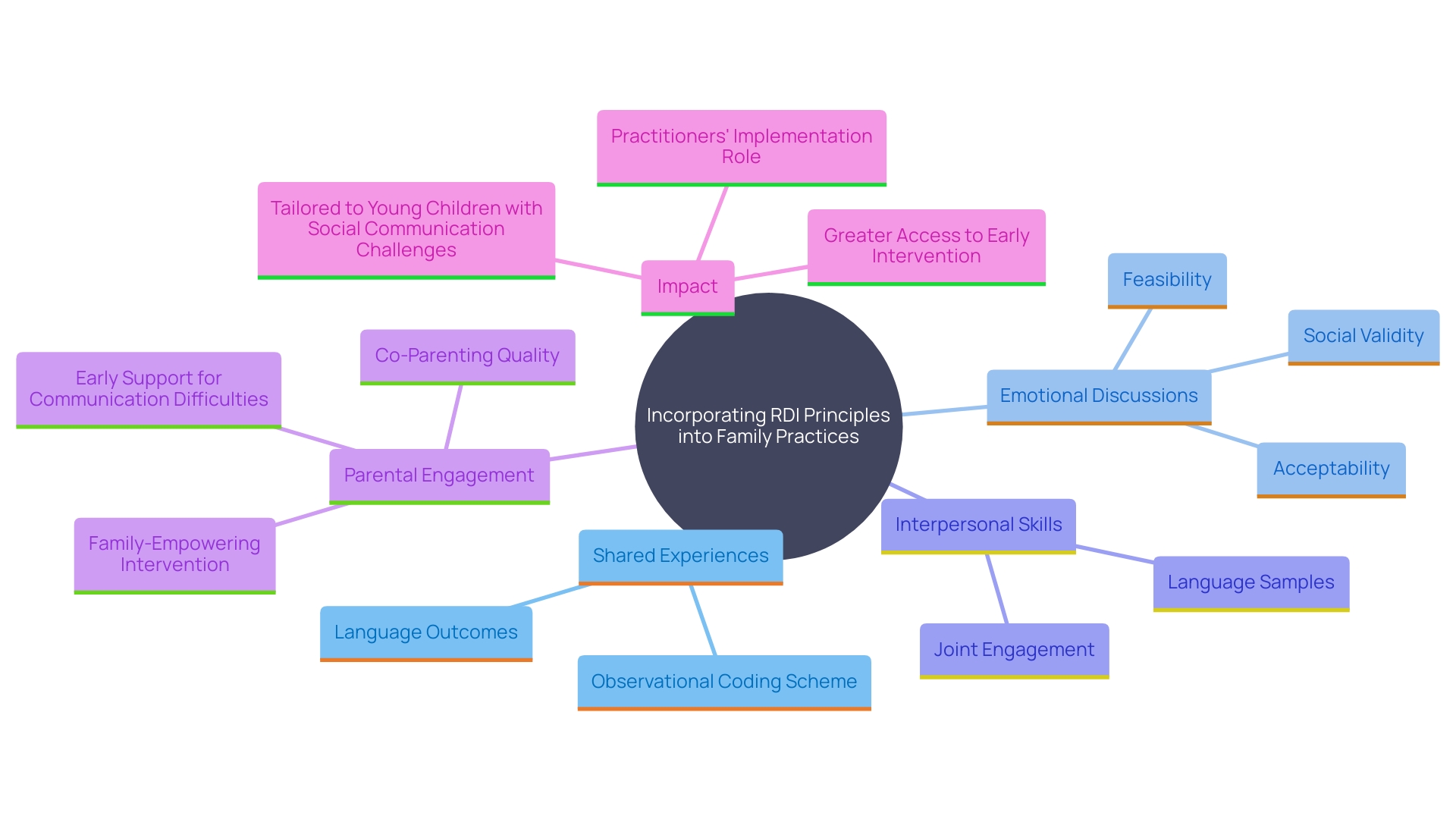
Challenges and Success Stories with RDI
Introducing RDI can certainly pose difficulties for families, such as resistance to change, inconsistent professional support, and the emotional intricacies of navigating interpersonal dynamics. These obstacles are compounded by the high demand for time, energy, and often the need for a primary caregiver to dedicate themselves almost exclusively to the young one. Families often encounter economic pressure, worry regarding their offspring's future, and an absence of community support, resulting in a heightened care responsibility, particularly for mothers. However, there are numerous success stories that highlight the transformative potential of RDI. For instance, many families report significant improvements in their offspring's social engagement and relationships. These positive experiences are supported by evidence indicating that responsive and engaging parent-offspring interactions are linked to better outcomes for autistic youths. Research has shown that even low-intensity support programs can result in significant enhancements in youth engagement and parental strategies. One study conducted in New Zealand found that youngsters in a low-intensity support group were more engaged and used a greater variety of language with their parents compared to a control group. Such findings emphasize the importance of continued support and the potential for growth and connection through RDI, offering hope and encouragement to families navigating these challenges.
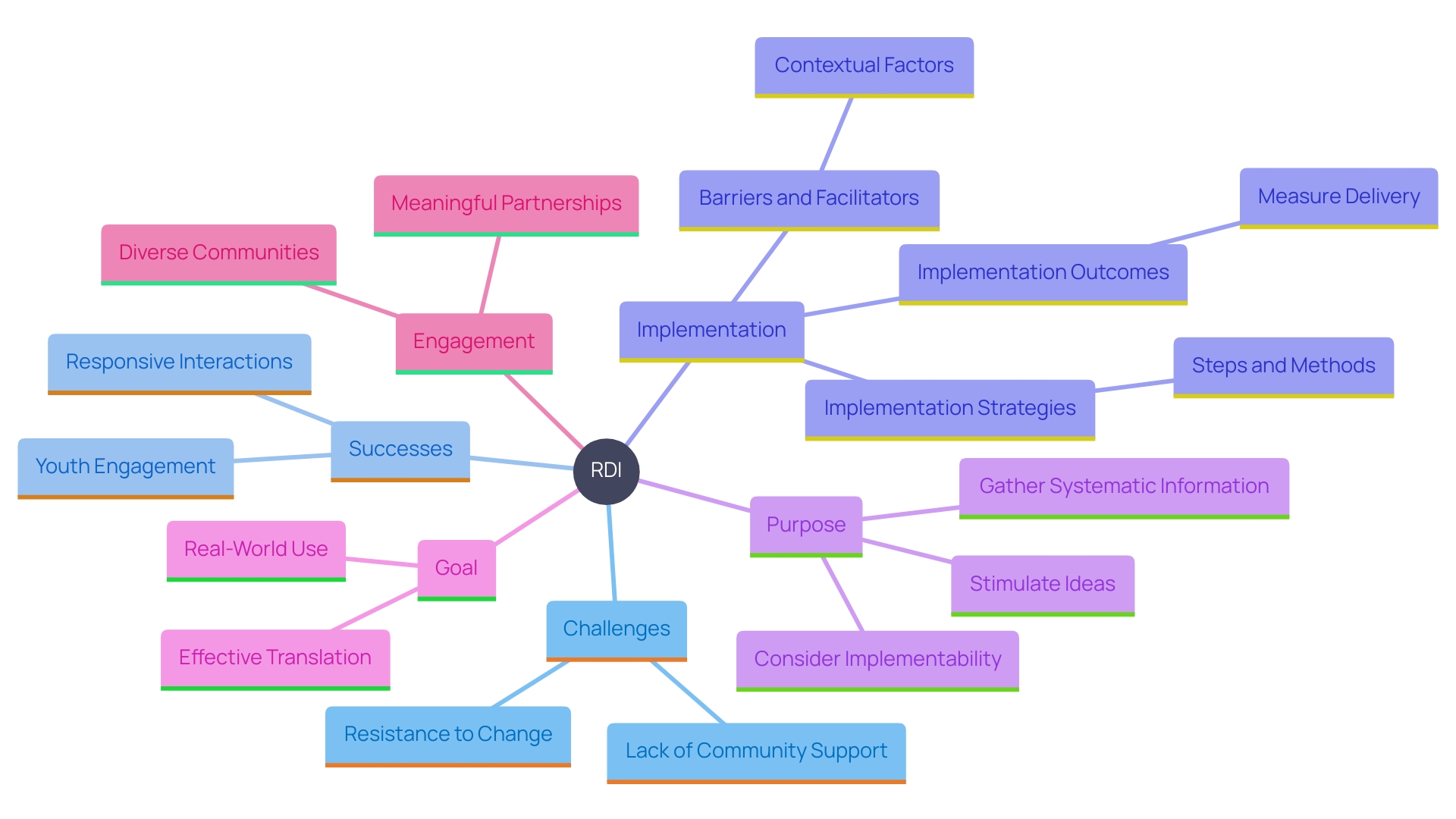
Resources for Learning More About RDI
For those interested in delving deeper into Relationship Development Intervention (RDI), a vast array of resources is accessible to support this therapeutic journey. The official RDI website is a valuable starting point, offering comprehensive information, including detailed guides, specialized training programs, and a supportive community forum. Additionally, the insights provided by Dr. Steven Gutstein and other prominent RDI practitioners through their books and workshops are indispensable. These resources provide practical strategies and techniques to effectively implement RDI, adapting them to the unique needs of each individual and family.
Connecting with local support groups can significantly enhance the RDI experience. These groups provide a platform for families to share their experiences, challenges, and successes, fostering a sense of community and mutual encouragement. Research indicates that peer support and community networks can alleviate parental stress and promote emotional well-being, which is crucial for families navigating the complexities of autism.
Furthermore, ongoing studies and upcoming releases keep broadening the availability and efficacy of early interventions designed for young individuals facing communication difficulties. Engaging with these resources and staying informed about the latest developments can empower families and practitioners to provide the best possible support for children with autism, fostering their social and emotional growth.
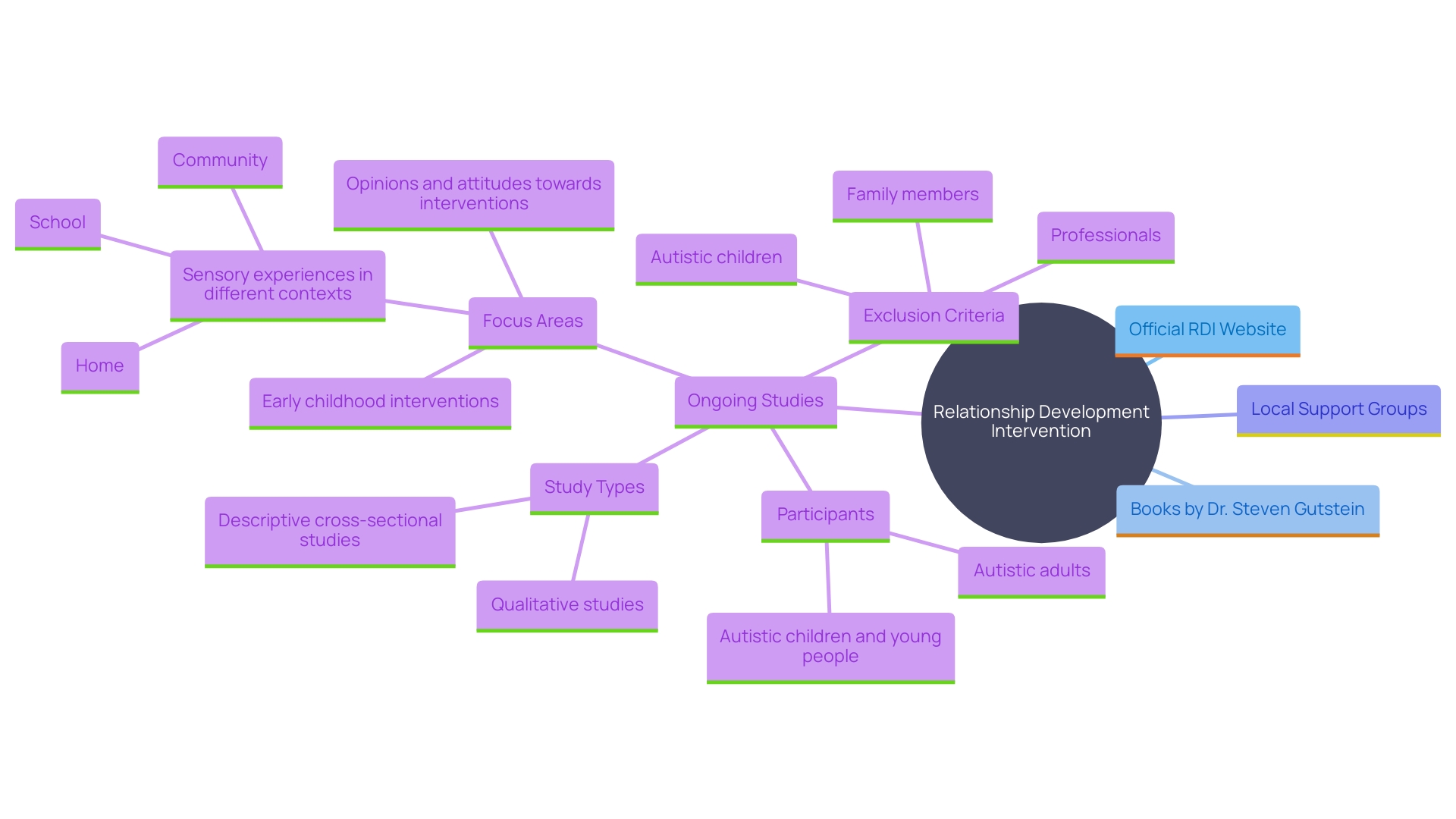
Conclusion
Navigating the journey of raising a child with autism spectrum disorder (ASD) can be challenging, but Relationship Development Intervention (RDI) offers a powerful framework for growth and connection. By emphasizing the importance of parent involvement and fostering genuine relationships, RDI equips families with the tools necessary to enhance their child's social and emotional development. The research supporting RDI highlights the effectiveness of early intervention, particularly when parents actively engage in their child's learning process, reinforcing the idea that the parent-child bond is pivotal in overcoming the challenges associated with autism.
The distinct principles of RDI set it apart from traditional interventions, focusing on dynamic intelligence and relational competence rather than merely behavior modification. This holistic approach nurtures children's ability to engage in meaningful interactions, promoting independence and emotional understanding. By integrating RDI principles into daily life, parents can create nurturing environments that facilitate social skill development and emotional growth, thereby empowering both themselves and their children.
While challenges may arise in implementing RDI, the success stories from families who have embraced this approach underscore its transformative potential. The positive outcomes associated with RDI serve as a beacon of hope, illustrating that with the right support and resources, children with autism can thrive in social settings. By leveraging available tools, connecting with supportive communities, and staying informed about the latest research, families can navigate this journey with confidence, fostering a sense of belonging and emotional well-being for their children.




